 Vanita Smythe, like Mabel Lee, was soundies discovery & insofar as she became known for her beauty & singing in the mid-1940s, it was the doing of producer William Forest Crouch. Crouch had tried to use soundies to launch new young performers into feature films. Vanita Smythe, like Mabel Lee, was soundies discovery & insofar as she became known for her beauty & singing in the mid-1940s, it was the doing of producer William Forest Crouch. Crouch had tried to use soundies to launch new young performers into feature films.
It was a good plan, but the soundies era didn't last long enough, & Vanita was being highlighted as an upcoming talent a bit late in the game. It meant her work with Crouch in the soundies would remain the primary record of her appeal.
She's standing in a torn-up speak-easy in They Raided the Joint (1946). The only other person in the place is a cop standing at attention. Vanita sings the jump-jazz pulling amusing faces with comic actress effectiveness.
A version by Helen Hulmes alters the drug references in the lyrics, so I'll quote the entire lyric as Vanita sang it.
"They raided the joint, took everybody down but me/ Yes they raided the joint, took everybody down but me/ Now I was standing in the corner, just as high as I could be.
"Some was drinking whiskey/ Some was drinking rum/ I didn't have a glass/ So they wouldn't give me none/ Yes they raided the joint, took everybody down but me/ And I was standing in the corner, just as high as I could be."
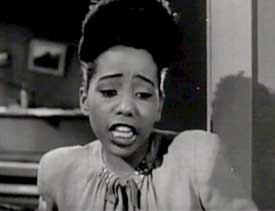 On the line "high as I could be" she gives a dizzy wiggle, & looks bloody serious about it all. The handsome cop just stands there with a severe expression. On the line "high as I could be" she gives a dizzy wiggle, & looks bloody serious about it all. The handsome cop just stands there with a severe expression.
"Well I saw an old man with a bag full of seeds/ I bet that cat breathes a whole lot of weed/ Yes they raided the joint, took everybody down but me/ And I was standing in the corner, just as high as I could be.
"Some was playing blackjack, some was playing skin/ I had plenty money but they wouldn't let me in/ Yes they raided the joint, took everybody down but me/ And I was standing in the corner, just as high as I could be."
By now Vanita has begun to hang on the cop a bit, but he's not responding to her tease. "They treated me like a stranger, just like a dirty dog. They ate a pile of chops, gave me the tail end of that hog/ Yes they raided the joint, took everybody down but me/ And I was standing in the corner, just as high as I could be.
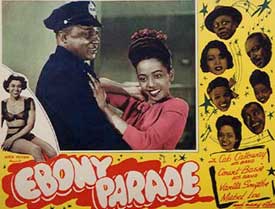 "Gee it sure was funny, the best I ever saw/ I heard somebody knockin' & in there walked the law/ Then they raided the joint, took everybody down but me/ And I was standing in the corner, just as high as I could be. "Gee it sure was funny, the best I ever saw/ I heard somebody knockin' & in there walked the law/ Then they raided the joint, took everybody down but me/ And I was standing in the corner, just as high as I could be.
"They were bookin' in the kitchen, truckin' in the hall/ I'm going down to the court & tell the judge about it all/ Cuz they raided the joint, took everybody down but me/ And I was standing in the corner, just as high as I could be."
This number was released as a single with Vanita still doing vocals, & Dan Burley playing a boogie-woogie piano.
We don't see Burley perfomring in the soundie but good chance that's him on the soundtrack, & the piano glimpsed in the backroom tips the hat. That's almost certainly his boogy-woogie piano on the soundtrack to Mabel Lee's soundie Chicken Shack Shuffle (1943).
The soundie was incorporated into Crouch's feature length Ebony Parade (1947) for Astor Pictures, directed by Crouch.
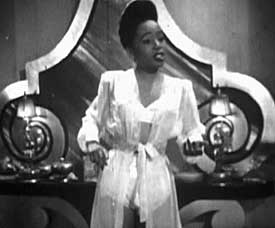 Vanita for another jump-jazz number Does You Do or Does You Don't (1946) is shown on a staged bedroom in open-fronted robe. She's seated at a mirror that doesn't reflect her or the room, because it's a fake mere.
Vanita for another jump-jazz number Does You Do or Does You Don't (1946) is shown on a staged bedroom in open-fronted robe. She's seated at a mirror that doesn't reflect her or the room, because it's a fake mere.
She begins almost at once to belt out the number with an excellent jazz-singer voice, reminscent of early 1930s black jazz singers.
The lyrics are obviously inspired by Louis Jordan's "Is You Is or Is You Ain't My Baby," & I wonder if Jordan, pals with director Crouch, mightn't be the actual composer. Vanita appeared in the Louis Jordan feature film Reet Petite & Gone (1947), in a non-singing role as a femme fatale.
Does You Do or Does You Don't could easily have been sung in the jump-jazz or Jordan style, but Vanita sings it a mite old-fashioned -- a tad jolsenesque in her presentation of the lyrics:
"Does you do or doesn't you don't/ Will you will or will you won't/ Hang around & play around with me./ Does you don't or does you don't/ Will you will or will you won't/ Be my pal & keep my company.
"It ain't funny, I got a lot to lend/ Plenty of money that I'm wililng to spend/ I'm built too fine with plenty of speed/ Got everything that a good man needs./ Does you do or doesn't you don't/ Will you will or will you won't/ Hang around & jive around with me."
Vanita has a dancer's body, but in fact did not share Mabel Lee's skill in this department; so her dance at the instrumental interlude, though graceful, is minimalist.
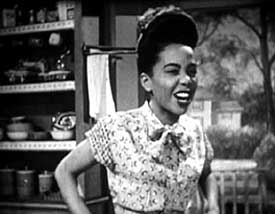 Most of Vanita's soundies pushed against propriety as a sexy, sexy singer with daring lyrics, & it's a shame she didn't have a much broader career so that we could have a lot more of her today.
Most of Vanita's soundies pushed against propriety as a sexy, sexy singer with daring lyrics, & it's a shame she didn't have a much broader career so that we could have a lot more of her today.
In Back Door Man (1946) she's in a kitchen setting wearing a print dress like a housewife or older sister, singing a number with racy lyrics, in her typically retro-jazz manner.
The very title being an old jazz slang designation for a guy who sneaks around the homes of married women. Though in this case, her guy is dressed as a chauffeur (silly me, I initially thought he was a police officer).
So "back door" could refer to servants' entrance for cook & chauffeur. The setting doesn't look like some ritzy home that could afford servants, however, & I like to think of it as the kitchen to the singer's own house.
"He comes in through the kitchen door/ Warms my dinner & then some more/ He's my idol & I'm his fan/ That's my back door man./ Hangs his hat up in my play room/ Starts to weaving upon my loom/ He's my idol & I'm his fan/ He's my back door man.
"Well he knows all the answers/ And he knows right from wrong/ He inspires my music/ He does a whole long of things to my song./ He ain't rich & I don't care/ All I want is his love to share/ He's my idol & I'm his fan/ He's my back door man."
A story so overtly amoral is bound to play the switcheroo, & when Vanita's back door man arrives, he's no jazzman at all but a simple working man. He's handsome & adoring & just oh-so innocent-faced.
He greets her as any man would his wife & sits at the table for a meal, as Vanita continues to sing for him, & does one of her minimal dances. So what begins as risque turns out to be wholesome. A nice little soundie!
Additional Vanita Smythe soundies which I hope eventually to review here, all from 1946, are these: What Good Am I Without You; I Need a Playmate; Get It Off Your Mind; Show Had a Wonderful Time; & Low, Short & Squatty.
copyright © by Paghat the Ratgirl
|
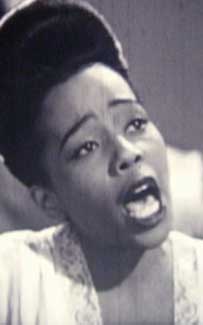

 On the line "high as I could be" she gives a dizzy wiggle, & looks bloody serious about it all. The handsome cop just stands there with a severe expression.
On the line "high as I could be" she gives a dizzy wiggle, & looks bloody serious about it all. The handsome cop just stands there with a severe expression. "Gee it sure was funny, the best I ever saw/ I heard somebody knockin' & in there walked the law/ Then they raided the joint, took everybody down but me/ And I was standing in the corner, just as high as I could be.
"Gee it sure was funny, the best I ever saw/ I heard somebody knockin' & in there walked the law/ Then they raided the joint, took everybody down but me/ And I was standing in the corner, just as high as I could be.
